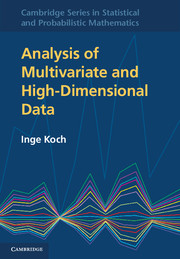Book contents
- Frontmatter
- Dedication
- Contents
- List of Algorithms
- Notation
- Preface
- I Classical Methods
- 1 Multidimensional Data
- 2 Principal Component Analysis
- 3 Canonical Correlation Analysis
- 4 Discriminant Analysis
- Problems for Part I
- II Factors and Groupings
- III Non-Gaussian Analysis
- Problems for Part III
- References
- Author Index
- Subject Index
- Data Index
4 - Discriminant Analysis
from I - Classical Methods
Published online by Cambridge University Press: 05 June 2014
- Frontmatter
- Dedication
- Contents
- List of Algorithms
- Notation
- Preface
- I Classical Methods
- 1 Multidimensional Data
- 2 Principal Component Analysis
- 3 Canonical Correlation Analysis
- 4 Discriminant Analysis
- Problems for Part I
- II Factors and Groupings
- III Non-Gaussian Analysis
- Problems for Part III
- References
- Author Index
- Subject Index
- Data Index
Summary
‘That's not a regular rule: you invented it just now.’ ‘It's the oldest rule in the book,’ said the King. ‘Then it ought to be Number One,’ said Alice (Lewis Carroll, Alice's Adventures in Wonderland, 1865).
Introduction
To discriminate means to single out, to recognise and understand differences and to distinguish. Of special interest is discrimination in two-class problems: A tumour is benign or malignant, and the correct diagnosis needs to be obtained. In the finance and credit-risk area, one wants to assess whether a company is likely to go bankrupt in the next few years or whether a client will default on mortgage repayments. To be able to make decisions in these situations, one needs to understand what distinguishes a ‘good’ client from one who is likely to default or go bankrupt.
Discriminant Analysis starts with data for which the classes are known and finds characteristics of the observations that accurately predict each observation's class. One then combines this information into a rule which leads to a partitioning of the observations into disjoint classes. When using Discriminant Analysis for tumour diagnosis, for example, the first step is to determine the variables which best characterise the difference between the benign and malignant groups – based on data for tumours whose status (benign or malignant) is known – and to construct a decision rule based on these variables.
Information
- Type
- Chapter
- Information
- Analysis of Multivariate and High-Dimensional Data , pp. 116 - 164Publisher: Cambridge University PressPrint publication year: 2013
